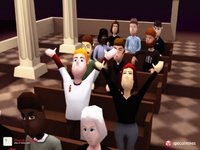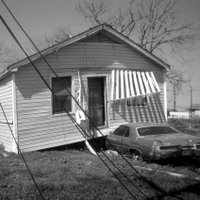The following will assume a reading of the post linked above.
Let me preface this post with the following clarifications. Allie, who wrote the referenced post, is my friend, and a trusted friend of my family. As such, I want to make it clear that I am not attempting a retaliatory personal attack on her. Nor am I attempting to start a “blog war” or stoke the fires of meaningless debate. Much of Allie’s post is a well-articulated critique of writing styles, observations, and personal reactions to R.C. Sproul, Wayne Grudem, and John Piper. My intent is not to refute her personal opinions of these men, nor is it to elevate or glorify those individuals. However, there are some issues presented I feel I should, in good conscience, clarify if I am able. In short, I simply want to respectfully present a contrasting view or clarification of a couple of issues presented in her post, specifically the TNIV controversy and Open Theism.
I have only briefly presented Dr. Grudem’s side of the argument here. You can read both sides of the TNIV debate, including specific texts and examples presented by both Dr. Grudem and Dr. Strauss. Click here to read the transcript of their debate. If you’re interested in the issue, it’s a worthwhile read.
John Piper vs. Open Theism: I cannot objectively speak to the how of Dr. Piper’s addressing Open Theism, but I think I can speak on the why he addresses this issue so forcibly. Open Theism (also called Free Will Theism or the Openness of God View) is a theological position dealing with the free will of man (er… people), that free will in relationship to God, and the nature of the future. At its core, Open Theism teaches that God has given humanity free will and in order for humans to be truly free, the future choices of individuals are wholly unknown by God, who “self-limits” or denies His own sovereignty, omniscience and omnipresence. Books like The Openness of God, by Clark Pinnock and The God of the Possible, by Greg Boyd and a few others of like ilk (written mostly since the 1980’s, I think) have trumpeted Open Theism, or an “open” view of God. Interestingly, Greg Boyd claims that the differences between the openness and orthodox views of God are "relatively unimportant," "peripheral" and "minor". (The God of the Possible, pp. 8, 20, 29) Yet, I find that Open Theism asserts a radically different understanding of God than Scripture presents. It is an unnecessary – and harmful, in my estimation – attempt to promote the will and responsibility of man at the expense of the divine sovereignty of God.
As with most camps of thought (theological or otherwise) there are smaller, inner divisions or denominations. In Open Theism, some proponents hold the future is knowable while others say it is not knowable. For the Open Theists who hold that the future is knowable by God, they maintain that God voluntarily limits His knowledge of free-will choices so that human beings can remain “truly free.” Others assert that the future is non-existent and therefore unknowable, even by God. Either way, God is presented as reactionary and limited, trapped either by self-imposed boundaries or by the linear passage of time itself. Despite this, most Open Theists would deny that they present God as weak or powerless. They instead promote that God is simply capable of predicting future events and is capable of bringing certain major events to pass when needed. (i.e., God could inspire the Old Testament writers to prophecy certain events and then He could simply ensure that those events occur at the right time.) Open Theists also claim that they do not deny God’s omniscience. “They, like classical theologians, state that God is indeed all-knowing. But they differ in that God can only know that which is knowable and since the future has not yet happened, it can not be exhaustively known by God. Instead, God only knows the present exhaustively, including the inclinations, desires, thoughts, and hopes of all people.” (Matthew Slick, What is Open Theism? www.carm.org)
In Open Theism, God is simply reactionary to what is happening in the human “now”; either by volition or happenstance, He is trapped in time along with His own creation; He takes risks that may or may not turn out as He hopes, like a cosmic Gambler of sorts; He "regrets how decisions he's made turn out," "questions how aspects of the future will go," and "experiences frustration because free agents choose unlikely courses of action" (Ibid, 87). An Open Theist would counsel a person who has experienced great tragedy or suffering that God was as surprised as everyone else at what happened. Open Theism even concedes this point: "It is true that according to the open view things can happen in our lives that God didn't plan or even foreknow with certainty (though he always foreknew they were possible). This means that in the open view things can happen to us that have no overarching divine purpose" (Ibid, 153). Strangely, according to Open Theism’s view, this makes God kinder and gentler and therefore more trustworthy. If God knew “bad things” were going to happen in the future, He would be a bad God (i.e., evil) not to prevent them from happening. Therefore, God must not know the future in order to remain good - or so it goes with Open Theism.
This view of God is supposed to inspire comfort and hope on the part of believers; but in fact, it destroys the very foundation that the Bible establishes for trusting God, undermining confidence in Him, Scripture, prayer, and faith in Christ. It is a diminished view of God that in my estimation attempts to put the will of man and God’s love of man as the central crux in all God does. These are hardly peripheral issues. I find it no stretch to imagine Open Theism falling diametrically opposite of hyper-Calvinism; God becomes the puppet attached to strings of human whim.
"The gravest question before the Church is always God Himself, and the most portentous fact about any man is not what he at a given time may say or do, but what he in his deep heart conceives God to be like. … Were we able to extract from any man a complete answer to the question, 'What comes into your mind when you think about God?' we might predict with certainty the spiritual future of that man." – A.W. Tozer, The Knowledge of the Holy
As always, your thoughts, clarifications, comments, and corrections are welcomed.





